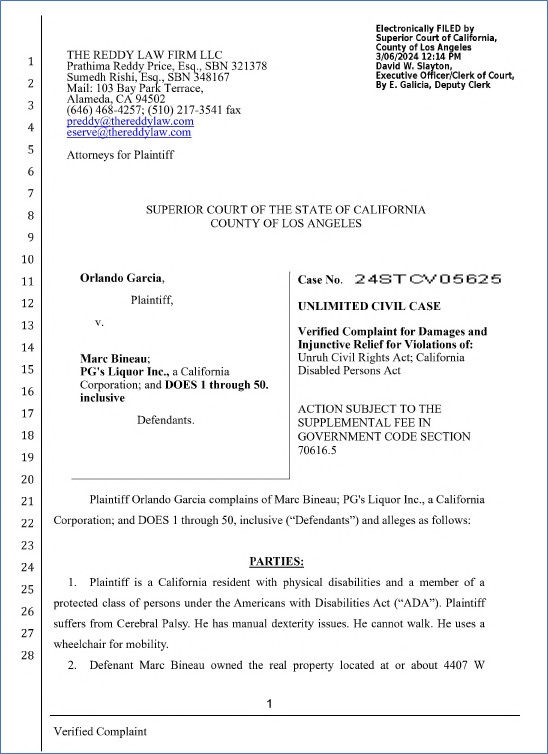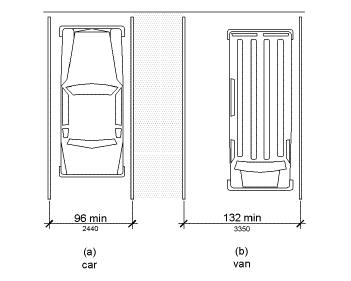02 August 2024
See how JMBM’s Global Hospitality Group® can help you.
Click here for the latest articles on ADA Compliance and Defense.
An offshoot of the well-established Potter Handy firm, The Reddy Law Firm is quickly becoming known for its aggressive pursuit of claims under the California Unruh Civil Rights Act and the California Disabled Persons Act. These lawsuits, often referencing the Americans with Disabilities Act (ADA), are primarily filed by serial plaintiffs who challenge businesses on a variety of accessibility issues, from parking and entrances to sales counters. With a growing number of cases being filed, especially in California state courts, it’s crucial for businesses to understand how to effectively respond to and navigate these legal challenges. In the article below, JMBM partner Stuart Tubis explores the key aspects of these lawsuits, provides guidance on how to handle them, and offers insights into the best practices for addressing such claims.
ADA Defense Lawyer: How to Respond to a Lawsuit filed by The Reddy Law Firm for Violation of the Unruh Civil Rights Act, California Disabled Persons Act, or ADA
by
Stuart Tubis, JMBM’s ADA Compliance & Defense Group
The Reddy Law Firm LLC is a relatively new law firm that started filing accessibility lawsuits on behalf of various plaintiffs alleging violations of the California Unruh Civil Rights Act and California Disabled Persons Act. Though a relatively new ADA plaintiff’s lawyers, the firm is an offshoot of Potter Handy, from San Diego. The lawsuits generally reference the Americans with Disabilities Act (ADA) as well.
Generally, each of these lawsuits are filed on behalf of one of several serial plaintiffs, who file many similar cases each year. Some serial ADA plaintiffs in California have been known to file hundreds, sometimes thousands of lawsuits each against various businesses.
The Reddy Law Firm has filed Unruh litigation on behalf of these plaintiffs:
- Meryl Pomponio
- Orlando Garcia
- Brian Whitaker
These lawsuits show no signs of stopping. Each lawsuit includes a summons as a cover page informing you that you have been sued and must respond. It also contains the complaint itself, which generally looks something like this:

The complaints have generally stated in the first paragraph “Plaintiff is a California resident with physical disabilities and a member of a protected class of persons under the Americans with Disabilities Act.”
It goes on to allege that the Plaintiff is disabled, tried to access the goods and services of the defendant’s business, and was unable to because the facilities were in violation of the ADA and California law. Common issues identified in the lawsuits include parking, paths of travel, entrances, and sales counters.
There are specific accessibility requirements applicable to most businesses and places open to the public as outlined in the ADA and California law. For example, accessible parking should not have a slope greater than 2.1% and should have proper dimensions, striping and signage as well as a striped access aisle next to it.

Located in Alameda California, The Reddy Law Firm is owned by Prathima Reddy, Esq. according to its website. It’s possible that the lawsuit could focus on website accessibility issues for a blind plaintiff, although this does not seem to be the focus of litigation filed by The Reddy Firm at this time.
The first thing you’ll need to do is respond to the complaint within 30 days of service of the lawsuit if filed in the Superior Court of the State of California. Otherwise, the plaintiff can request a default judgment be entered against you by the court for failure to respond.
Many similar lawsuits used to be filed in federal court. In recent years, however, plaintiffs filing such cases have preferred California State Court likely seeking a more friendly and anonymous forum. If filed in federal court the case is assigned to one judge who is responsible for everything in the case. State court cases are harder to track compared to federal cases. Also, unlike cases filed in state court, federal judges become intimately familiar with and scrutinize the cases, the parties and the lawyers. Many of the lawsuits are filed in Superior Court for the County of San Francisco, Los Angeles, Orange or Contra Costa but could be filed in other counties depending on the location of the business and facts involved. Generally, responding to the complaint involves filing an answer that either admits or denies the various allegations and asserts relevant affirmative defenses helpful to the case, such as lack of standing or statute of limitations issues.
It might be more prudent, however, to file a motion to dismiss if there are strong defenses. It is important to hire experienced ADA/Unruh counsel to represent you and advise you on the viable defenses for your specific case, such as JMBM’s ADA Compliance and Defense attorneys.
You and your counsel should determine if the claims alleged in the complaint are valid. In other words – is there liability? Some lawsuits lack merit and can be defended or dismissed by the court. See my articles on these topics:
How To Defend An ADA Or Unruh Lawsuit For Lack Of Standing by Stuart Tubis
California Unruh Civil Rights Act Law Basics by Stuart Tubis
If there is liability, the next step is to explore a possible settlement of the case. The goal of this approach is to negotiate the best terms possible given the facts and circumstances of the case. We always seek to lower the settlement amount for our clients as much as possible, provide plenty of time to update the property, and obtain a full release of liability with complete dismissal of the lawsuit. In settlement negotiations, resolving the lawsuit in the most efficient way possible is the objective.

Stuart K. Tubis is a partner attorney at Jeffer Mangels Butler & Mitchell LLP and a member of JMBM’s ADA Compliance & Defense Group. Stu counsels businesses and landlords on the full spectrum of ADA compliance issues and represents their interests in litigation and Department of Justice investigations. He has a background in technology, which helps in resolving the growing area of website accessibility issues. Contact Stuart K. Tubis at 415.984.9622 or SKT@jmbm.com.

This is Jim Butler, author of www.HotelLawBlog.com and founding partner of JMBM and JMBM’s Global Hospitality Group®. We provide business and legal advice to hotel owners, developers, independent operators, and investors. This advice covers critical hotel issues such as hotel purchase, sale, development, financing, franchise, management, ADA, and IP matters. We also have compelling experience in hotel litigation, union avoidance and union negotiations, and cybersecurity & data privacy.
JMBM’s Global Hospitality Group® has been involved in more than $125 billion of hotel transactions and more than 4,700 hotel properties located around the globe. Contact me at +1-310-201-3526 or jbutler@jmbm.com to discuss how we can help.
How can we help? Brochure Credentials Photo Gallery



